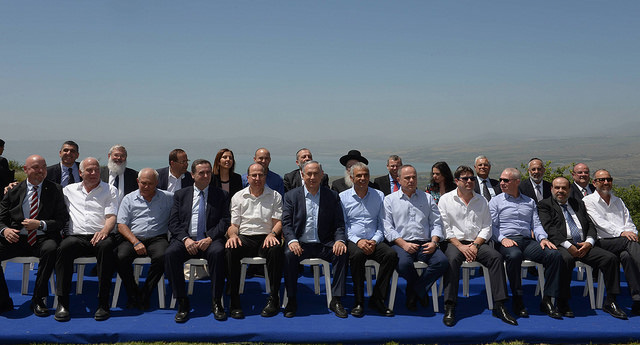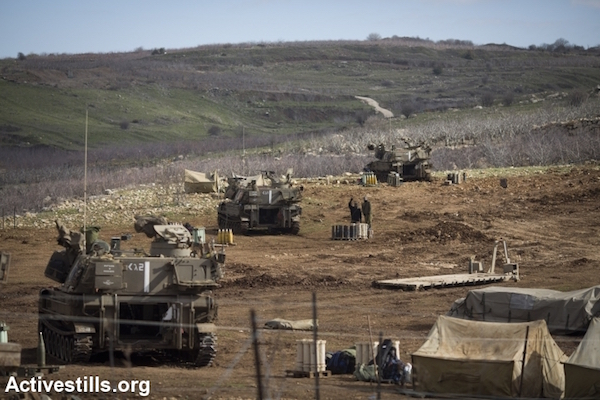In less than a week, the Israeli prime minister admitted to military action in Syria and declared to the world that Israel will never relinquish the Golan Heights, which it unilaterally annexed 35 years ago.
By Shemuel Meir

What led Prime Minister Benjamin Netanyahu to wake up one fine day and declare, during a highly publicized but insignificant reserve duty exercise in the Golan Heights (and without the army Chief of Staff present, as is customary) that “we struck Syria dozens of times”? Was it a slip of the tongue stemming from the overconfidence that has become so typical lately? A desire to earn political points with other politicians who aren’t threatening his position of power? An effort to distract from other issues? Could it be that the prime minister wanted to send a deterrent message at a time when no special military developments have occurred in the area? All this happened at a time when Israel managed to maintain freedom of action in Syria thanks to its declarative ambiguity, clandestine military coordination with other powers and the setting of red lines with Iran, which haven’t caused any undesired complications.
Despite the military terminology and context of Netanyahu’s performance in the Golan, the answer to this riddle can be found on the diplomatic front. The discussion’s point of departure is a panic that has gripped Netanyahu following recent under-the-radar developments in the Syrian crisis that disrupted his previous plans. Something that caused him to hastily send President Reuven Rivlin to Moscow (while violating diplomatic protocol with our ally Australia) and arranging an urgent meeting for himself with Russian President Putin the night of the Passover seder. Something that led Netanyahu to tell U.S. Secretary of State Kerry over the phone a few days ago, “it won’t happen.”
So what went wrong? It appears Netanyahu was trying to take advantage of the civil war and disintegration of Syria in order to gain international recognition for redefining Israel’s borders. In March, just like the tragedy of Julius Caesar, things in Syria started getting complicated, albeit under the surface on the diplomatic front– but for Netanyahu, it demanded urgent action. That’s how we got to the riddle at the beginning of the article. Netanyahu kept a low profile and didn’t rail against the UN Security Council Resolution 2254 (December 2015) endorsing a road map for a peace process in Syria, which in its first clause called for “reaffirming its strong commitment to the sovereignty, independence, unity and territorial integrity of the Syrian Arab Republic.” It’s possible he didn’t want to highlight Israel’s marginal role in the Syrian stabilization process. But in March 2016 things started progressing on the operational front that went against Netanyahu’s hopes of annexing Syrian land in the fog of its collapse.
In mid-March a reporter with Sputnik International, a Putin mouthpiece, interviewed the head of President Bashar Assad’s delegation to the negotiations with the rebels and the world powers in Geneva to end the Syrian crisis. The piece addressed only one issue: Assad’s demand, conveyed to the special UN envoy Staffan de Mistura, to include the “the return of the occupied Syrian Golan according to the 1967 borders.” A few days later, on March 24, the special envoy published a working paper (on the digital equivalent of UN Geneva headquarters letterhead) that was supposed to serve as a basis for a solution. The working paper detailed “Point of Commonalities” reached by the Assad government and the rebels, under the auspices of the process launched by by Secretary of State Kerry and his Russian counterpart Sergei Lavrov.
The first point of agreement in the working paper: “respect for the sovereignty, independence, unity and territorial integrity of Syria. No part of the national territory shall be ceded…The people of Syria remain committed to the restoration of the occupied Golan Heights by peaceful means.” This is the version that the U.S. and Russia agreed on. On 13 April, Secretary Kerry spoke UN Special Envoy Staffan de Mistura on the resumption of the Geneva talks and “reaffirmed strong U.S. support for the talks” based on UN Security Council Resolution 2254. In such a situation, in which there is a global vision of returning the Syrian Golan to the pre-1967 borders – the chances of reaching international recognition of Israel’s annexation of the territory are nil.
Netanyahu’s response to the fading dream of the Golan was heard this week past week when he declared at the first ever cabinet meeting held on the Golan Heights that this territory will forever remain in Israel’s hands. He sent a clear message that Israel will never withdraw from the Golan, which he described as “an integral part of the State of Israel.” Netanyahu added that after 50 years, it is time “the international community finally recognizes that the Golan Heights will remain under Israel’s sovereignty permanently.”

Despite the first impression, Netanyahu’s combative declaration in the Golan wasn’t meant for just the usual suspects (Iran and other regional players) but also and primarily for American and Russian ears. The declaration was meant to remind them that “we too are here” and imply the need to take another regional player – Israel — into consideration in the various military and diplomatic scenarios that don’t correspond with their proposed solution. This is apparently what Netanyahu meant when he told Kerry recently (according to a direct quote leaked by a political correspondent from the Israel Hayom newspaper which is known reflects the Prime Minister’s thinking), that Assad will forget about the Golan. That “it won’t happen.” Israel will never give back the Golan Heights, to anyone.
According to the Geneva working papers — and contrary to Netanyahu’s position – it is not only Assad who is demanding the return of the Golan as part of the solution to the Syrian crisis, but also the rebel groups. The U.S., Russia, EU and the rest of the world also make this demand. The chaos in Syria has not changed the rules of the international game.
Indeed, within 24 hours, the U.S. and Germany (both close allies of Israel) strongly criticized Netanyahu’s declaration on the Golan Heights. The U.S. State Department spokesman reaffirmed that “these territories are not part of Israel.” The German Foreign Ministry spokesman bluntly rejected Netanyahu’s unilateral annexation statement. He reminded Israel that it is a basic principle of international law and of the UN Charter that “no state can claim the right to annex another state’s territory just like that.”
The international community does not share the prime minister’s view that after 50 years of Israeli military control of the Golan Heights it is time to recognize its formal annexation to Israel.

The Golan affair should also be seen in the context of a less noticed but important issue in the U.S.-Israel strategic partnership. Former cabinet secretary and long-time Netanyahu aide Zvi Hauser has been actively promoting an initiative – an historical opportunity in the Golan, according to an article in Haaretz – to gain international recognition of Israel’s annexation of the Golan. The central point in Hauser’s plan: formulating an equation against the “bad Iran deal” and demanding “strategic compensation” from the U.S., which he believes is the only way to guarantee Israeli security. The strategic compensation Hauser — and in effect Netanyahu — wants is territorial: American recognition of Israel’s annexation of the Golan, and as a the first stage, “a presidential guarantee and congressional legislation” affirming Israel’s continued control.
Hauser and Netanyahu apparently believed that after U.S. recognition of Israel’s annexation of the Syrian Golan, a domino effect would begin, spurring Russia and the European Union to follow suit. It is worth recalling a leak to the Israeli press that was not denied by either Israel or the U.S. According to Haaretz reporter Barak Ravid, (10 November 2015) the prime minister suggested that the U.S. president “rethink” the future status of the Golan Heights and Israel’s contribution to stabilizing the region in light of Syria’s deterioration. The delay in the approval of the U.S. Military Aid Memorandum of Understanding (MOU) is unprecedented in the special Israel-U.S. relationship. It is possible that this delay is due in part to Israel’s demand for a “strategic territorial compensation” following the Iran deal, which Israel so strongly opposed.
Shemuel Meir is a former IDF analyst and associate researcher at the Jaffee Center for Strategic Studies at Tel Aviv University. Today he is an independent researcher on nuclear and strategic issues and author of the “Strategic Discourse” blog, which appears in Haaretz.
